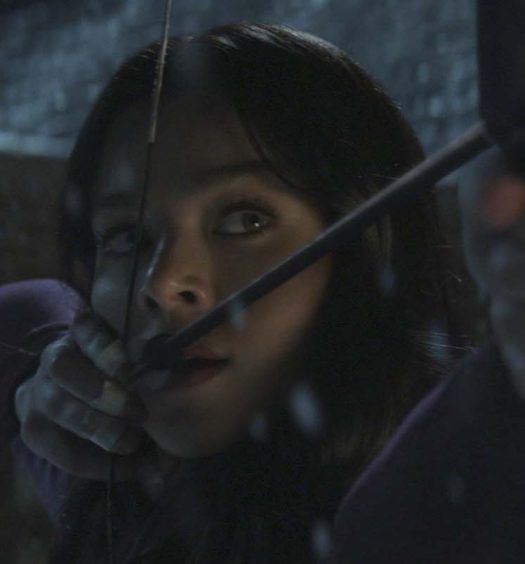In this issue of Jupiter's Circle, Mark Millar chooses to talk about civil unrest. In a superhero comic. It's a bad idea.
This article contains spoilers for most of Jupiter’s Circle v2 #2. Read with caution.
The American consciousness, the American Dream, and the differences between American and European thought have been topics of Mark Millar’s comics for a long time. In the Jupiter’s Circle series, he has been exploring this a little more deeply. In this week’s Jupiter’s Circle v2 #2, he goes full speed into a reflection of the current American landscape, as seen through the mistakes of the past. It’s bad. It’s very bad.
Millar doesn’t bring Europolitics into this, which is a good thing. He chooses instead to take the past and match it to the present, comparing the Watts Riots of 1965 to what Americans see today. Jack Kerouac and William S. Burroughs of the Beat movement show up, to little effect; they don’t really accomplish much, aside from establishing that, yes, this is the 1960s. They watch the news and talk about the Watts Riots.
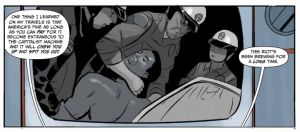
The superheroes are then drawn to a press conference that (surprise!) turns toward the Watts riots and racial epithets. Millar tries to sink the immerse the story in the language of the times, but won’t quite commit. Obviously, if he committed, there would be a lot of offended readers and a lot more articles about this. Perhaps controversy isn’t what he’s looking for. When you’re talking about 1965, specifically about Watts, however, there’s no room for tip-toeing.
So, Jupiter’s Circle is lousy with half-steps into actually saying anything, where Millar’s almost certainly trying to. Millar has come under fire for his portrayal of women, rape, and jingoism, among other things; he’s been compared to shock-horror filmmakers. In the last few years, he’s tried to revamp his image. This stinks of an attempt at that.
It’s exactly the wrong time and the wrong way to do so.
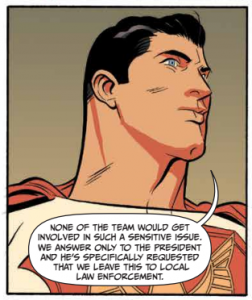
Hesitation toward the content could’ve been the thing that saved this issue of Jupiter’s Circle from going completely wrong. As the issue ends, Millar decides that he won’t hit the brakes as he speeds toward the wall. Skyfox decides he has to do something. He’s going to jump into the Watts Riots.
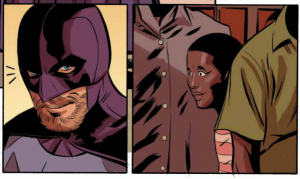
This is a bad decision. The ways in which this is a bad decision are close to innumerable.
Millar loves the idea of the superhero being able to do anything; the superhero existing as the bastion of hope that Jerry Siegel and Joe Shuster envisioned. There’s nothing inherently wrong with that. However, dropping a superhero into something like the Watts Riots, a pivotal moment in American history, is a backwards idea. It’s the truism about time travel: if you change anything, it changes everything. Maybe that’s the point. It’s only the first problem with Jupiter’s Circle.
Revisiting the image of Skyfox winking at the kid: here, Jupiter’s Circle gives us another story where the white guys save the black guys. As if pushing into this part of history wasn’t bad enough, we’re fed this month-old, moldy dish and told to eat up. Stories like this are exactly why people are running away from Big Two comics: representation is improving, but still utterly broken, often falling to the side of tokenization; the Great White Hope isn’t something that any fan under the age of forty, and certainly something that any non-white fan, wants to see anymore.
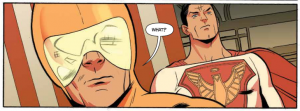
Jupiter’s Circle tells us what we already know: the mistakes of history are repeating themselves. The present day is scary, as was the past. The treatment of non-white people in America is disgusting. All agreeable items. Telling us this through the lens of the superhero, that aforementioned light on the hill, is the wrong way. This is a white bread story by a white bread guy told in a white bread way, about issues that are patently non-white. White people aren’t inherently bad; white people aren’t banned from being allies. Seeing white guys saving black people from white guys accomplishes nothing.
To state the obvious: superheroes don’t exist. One isn’t just going to drop out of the sky and stop things like Ferguson, Chicago’s Homan Square, the death of Sandra Bland, the shooting of Trayvon Martin, twelve-year-old Tamir Rice’s senseless death at the hands of police officers, and an unstoppably-growing list of horrors from happening. This is only the tip of the iceberg.
Superhero stories can’t fix what’s wrong with America. Especially when they’re told like this.


